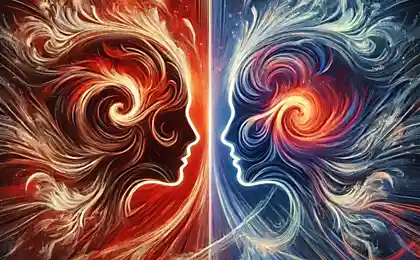150
6 types of internal conflicts and how to overcome them

Each person sooner or later finds himself in a situation where conflicting desires, beliefs or aspirations collide within him. Psychologists call it internal conflict, a phenomenon that can both paralyze our ability to make decisions and become a powerful catalyst for personal growth.
Research shows that 87% of people regularly experience internal conflicts that affect their quality of life.
Internal conflict arises not from external circumstances, but from the clash of different aspects of our personality. Imagine the situation: you dream of a creative career, but your parents insist on a “stable” profession. You love two people at the same time and can’t choose. Such dilemmas not only cause emotional pain, but can lead to serious psychological problems if ignored.
Key insight: Internal conflicts are not a sign of weakness or uncertainty. It is a natural part of the human experience, signaling that we are growing and evolving as individuals.
The Anatomy of Internal Conflict
Before dissecting the types of conflicts, it is important to understand the mechanism of their occurrence. Psychologist Kurt Levine identified three main forms of conflict: “approach-approach” (choice between two desirable alternatives), “avoidance” (choice between two undesirable options), and “approach-avoidance” (when one object simultaneously attracts and repels).

Six Types of Internal Conflict
1. Moral conflict
This type of conflict occurs when our actions or desires conflict with our moral beliefs and values. A classic example is a situation where a person is forced to lie in order to protect a loved one, although lying contradicts his principles.
How to overcome:
• Do a “Value Inventory” – make a list of what’s really important to you.
• Use the “moral dilemma” technique – imagine extreme scenarios and define your boundaries
• Practice mindful decision-making with long-term consequences
A study by psychologist Lawrence Kohlberg found that people with well-defined moral values experience less stress when making ethically difficult decisions.
2. Religious conflict
It arises when religious beliefs clash with modern realities, scientific knowledge or personal desires. For example, when a person doubts the dogmas of his faith or feels the contradiction between religious precepts and his own needs.
Solutions:
• Learn the different interpretations of religious texts
• Communicate with representatives of different faiths and philosophies
• Separate spirituality and institutional religion
• Find a balance between faith and reason
3. Love conflict
One of the most painful types is when the heart is torn between several people, or when love contradicts logic and circumstances. This includes the conflicts between passion and reason, between the desire for intimacy and the need for freedom.
Resolution strategies:
• Analyze your relationship needs (closeness, autonomy, security, growth)
• Use the “letter to future self” technique – describe how you see yourself in 5-10 years
• See a psychologist to work with attachment patterns
• Practice honest communication with partners
4. Self-perception conflict
It occurs when there is a discrepancy between the “ideal self” (what we want to be), the “real self” (what we are) and the “proper self” (what others think we should be). This conflict is particularly acute on social media, where people create idealized versions of themselves.
Methods of work:
• Practice self-compassion – treat yourself like your best friend
• Keep a diary of achievements, recording even small successes
• Use the “inner observer” technique for objective self-assessment
• Work with cognitive distortions

5. Interpersonal conflict
While the name may seem contradictory, this type of conflict occurs within us when we are unable to define our position in relation to others. For example, the desire to please everyone, the fear of rejection or the inability to set boundaries.
Decisions:
• Study your type of attachment and work with it
• Practice Assertiveness: Saying No Without Guilt
• Develop Emotional Intelligence
• Learn to recognize and express your needs
6. Existential conflict
The deepest type of conflict is associated with the search for the meaning of life, awareness of the finiteness of existence, freedom of choice and responsibility. Often manifests itself during periods of life crises or significant changes.
Ways to overcome:
• Learn the philosophical and psychological concepts of the meaning of life
• Find your ikigai – the intersection of what you love, know, what the world needs and what you pay for.
• Practice mindfulness and acceptance of uncertainty
• Create your own system of values and meanings
“Man’s greatest enemy is himself. But the truest friend is also himself. – Carl Gustav Jung
Universal strategies for dealing with internal conflicts
The technique of “Internal Dialogue”
Imagine that your conflicting parts are separate characters. Give each one a name and let them talk to each other on paper. It often helps to find a compromise or understand the true needs of each party.
The Wise Counsellor Method: Imagine that a close friend came to you for advice with exactly the same problem. What advice would you give him? We are often wiser about other people’s problems than our own.
Neuropsychological studies show that internal conflicts activate the anterior cingulate cortex, an area responsible for decision-making and emotional regulation. Meditative practices help to develop this field and improve the ability to resolve internal conflicts.
When it is worth asking for help
Sometimes internal conflicts are so intense that it is impossible to cope with them on their own. Signs that you need professional help:
• Conflict lasts more than three months without signs of resolution
• There are symptoms of depression or anxiety
• Conflict seriously affects work, relationships or health
• You avoid making any decisions.
• There were thoughts of self-harm.
Conclusion: Conflict as an Opportunity
Internal conflicts are not an obstacle to happiness, but an important part of the human experience. They signal that we are growing, evolving and facing new life challenges. The main thing is not to avoid them, but to learn to work with them, turning the inner contradiction into a source of self-knowledge and growth.
Glossary of terms
Internal conflict A psychological state in which conflicting motives, values or desires that create emotional tension collide in a person’s consciousness.
Cognitive distortions Systematic errors in thinking, leading to a distorted perception of reality (for example, catastrophism, black and white thinking).
Assertiveness The ability to defend their rights and interests without violating the rights of others.
Emotional intelligence The ability to recognize, understand and manage your own emotions as well as those of others.
ikigai A Japanese concept that means “the meaning of life” or “something worth waking up for in the morning.”
An existential crisis A psychological state characterized by doubts about the meaning and significance of one’s own existence.
10 Signs Your Relationship Has a Future, Even When Things Are Bad
Willow Day: The secrets of the success of the modern model and blogger























